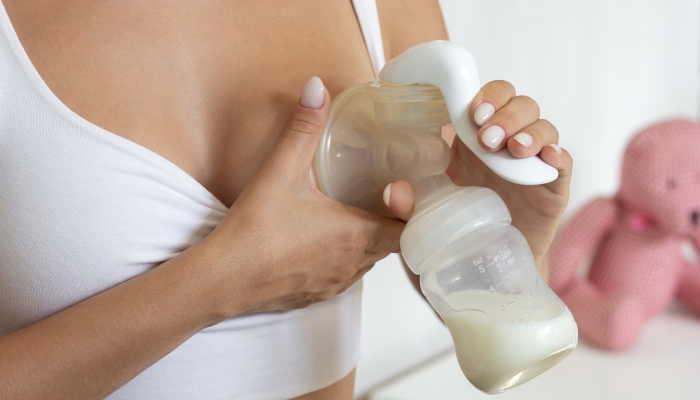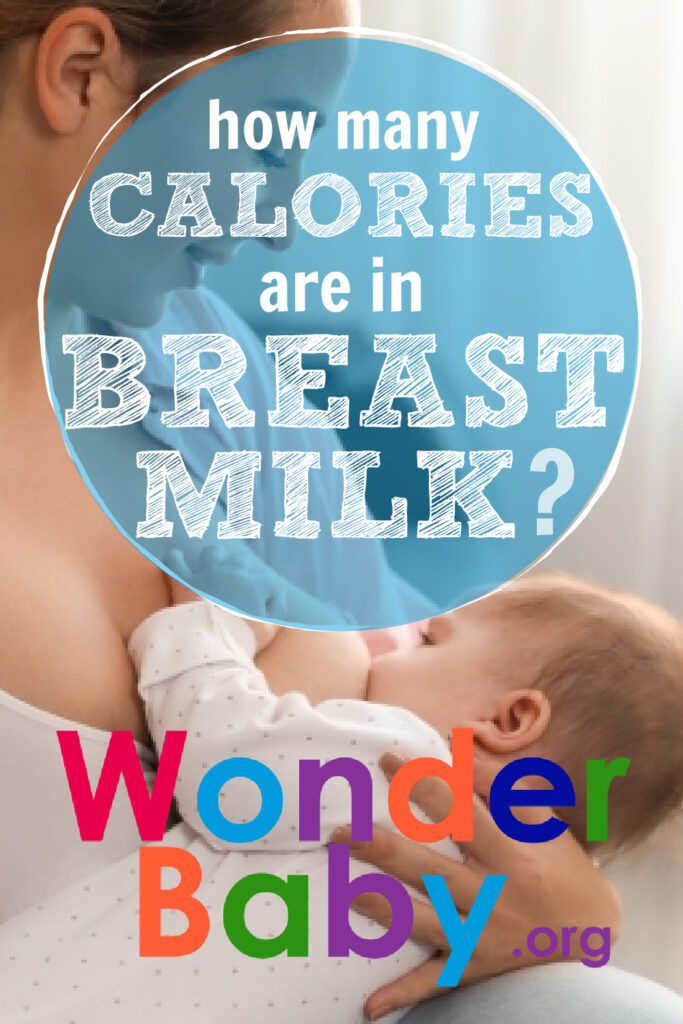How Many Calories Are in Breast Milk?

- Calories in breastmilk will typically range from 154 to 171 calories for an eight-ounce serving.
- Breast milk also contains protein, fat, carbohydrates, and additional essential nutrients.
- Babies need to consume many calories, fat, and a variety of nutrients for healthy growth.
- Human milk is the perfect food for infants.
- Mothers can improve breast milk nutrient content through proper diet and certain supplements.
I regularly hear the term “chubby” associated with breastfed babies. It is amazing how even the scrawniest newborns turn into little pudgy cherubs after a few months of nursing.
Recently, my youngest nephew was born. When I held our newest family member, I noted his skinny arms and legs as they pumped furiously, trying to get back to the safety of his mother, who was nearby.
Two months later, I visited this little breastfed baby and was surprised to see the change in his appearance. His body had filled out considerably, and his “chubby” face grinned at me contentedly from his perch in his momma’s arms.
This example may make you wonder why human breast milk nourishes our little ones so well. Perhaps you are like many new moms who take their doctor’s advice that breast milk is recommended over infant formula but don’t know why human milk is preferred.
In fact, there is a lot to know about breast milk itself and how it can affect your baby’s health!
As a busy working mother, I never thought about how many calories are in breast milk or its composition. If I had known all of the benefits of human milk and ways to make my milk even more nutritious, I would have benefited from that knowledge.
Overview of Breast Milk Production
Let’s start by breaking down how breast milk is produced to better understand how to improve its quality.
Women’s bodies are miraculously designed to produce human milk. Women are born with milk ducts and all the internal parts necessary to produce breast milk. During puberty, our breasts grow and mature, along with milk-making tissue.
Once pregnant, the hormones estrogen and progesterone cause your breasts to become fuller as the blood supply, milk ducts, and milk-making tissue all increase.
When you deliver your newborn, your estrogen and progesterone levels drop, and another hormone called prolactin rises. This sudden change in hormone levels causes increased milk production.
Now your breasts are primed to feed your little one. All you need is for your baby to latch onto your nipple and begin sucking. This suckling motion releases the last milk-making hormone, oxytocin, which helps to squeeze milk from your ducts through your nipple.
The more your baby nurses, the more milk is produced. This is the general rule, although some breastfeeding mothers have challenges with low milk supply, sometimes related to an improper breastfeeding routine or a clogged milk duct.
Once you and your baby get into a comfortable breastfeeding pattern, your milk production will meet your baby’s necessary caloric intake. Your baby should naturally gain adequate weight through breast milk calories.

What Are the Components of Breast Milk?
Breast milk is mainly composed of water, fat, protein, and carbohydrates (called lactose). Although baby formula may come close to mimicking mother’s milk, artificial substitutes can’t exactly replicate all of the essential nutrients found in human milk.
As you can see from the table below, breast milk is mainly composed of water. In fact, over 88% of your milk is made up of water.
Components of Breastmilk
| Components | Amount |
| Water | 88.1% |
| Carbohydrates (Lactose) | 7.0% |
| Fat | 3.8% |
| Protein | 0.9% |
| Other nutrients | 0.2% |
This ample water supply is one of the reasons that human milk is considered a perfect food for your baby. No water supplementation is necessary when nursing as human milk contains adequate water for your child’s hydration requirements.
The main carbohydrate in human breast milk is lactose. This important carbohydrate and others make up approximately 7% of breast milk. These carbohydrates provide energy and are vital for a baby’s brain development.
Fat is another major component of breast milk. The typical fat content of mother’s milk is approximately 3.8%. Fats, sometimes called lipids, are necessary for your baby’s adequate weight gain.
In addition, the fat content in human breast milk helps babies with the following:
- Brain development
- Adequate energy
- To feel full
- Develop certain hormones
- Some studies indicate breast milk lipids lead to improved overall health in later life, including reduced incidence of heart disease.
Protein is the last primary component of human milk.
0.9% of breast milk composition is made up of protein. The protein in breast milk helps babies to fight certain types of infections and grow healthy intestinal flora for a strong gut.
The balance of specific proteins in mother’s milk has been proven to be easier to digest than in artificial milk.
Additional nutrients found in breast milk are:
- Vitamin C and certain B vitamins(Pantothenic acid). Essential in the production of red blood cells and various hormones
- Minerals such as calcium, sodium, potassium, and magnesium. Necessary for bone growth and other essential bodily functions.
- Fatty acids. Needed in the maturation of the central nervous system.
Average Calorie Content of Breast Milk
Breastfeeding mothers have many matters to ponder when making feeding decisions. One consideration is the question, “does breast milk contain a higher amount of calories than infant formula”?
As a young mother, I had never thought about how many calories are in breast milk. However, infant growth depends on adequate caloric intake. The calories in breast milk are especially important for moms experiencing a sudden drop in milk supply, or who have babies who are not thriving or are premature.
So What Are the Calories in Breast Milk?
The milk produced by lactating women can range from 154 to 171 calories for an eight-ounce serving. Most of those calories are due to the high-fat content, which can vary from day to day for a variety of reasons.
Although both breast milk and formula contain adequate calories for your baby, human milk is typically slightly higher in calories than artificial substitutes. This fact is vital for many lactating mothers who want to make every precious drop count.

Factors That Affect the Calorie and Nutritional Content of Breast Milk
When you pump and allow your milk to settle in a clear bottle, did you ever notice the layer of fat and clear fluid in the container?
Some days the milk appears to have more fat, while other times, water content is more predominant.
Lactating mothers may fret over what appears to be a watery breast milk supply. You may wonder if watery breast milk contains less calories and nutrients than fattier output.
The best answer is that you should typically not have to worry about this natural occurrence. Your amazing body is designed to produce an infant feeding perfect for your baby!
At times, breast milk will appear different, with the supply looking watery at one point and fat-filled the next. Your mature milk production naturally adjusts to you and your baby’s needs.
However, some factors can affect breast milk’s calorie and nutritional content.
The following can negatively impact the composition of your milk:
- Poor nutrition in general
- Certain medications
- Vitamin deficiencies
- Age of mother
- Delivering a preterm infant
- Maternal obesity
- Smoking
Your provider and lactation consultant are the best sources for questions about proper diet when expecting and breastfeeding and how your medication may impact your milk.
Also, freezing or storing your milk in the refrigerator may slightly decrease the nutrients. (Tip: Improperly refreezing breast milk may ruin the nutrients and be unsafe, so care is needed if you choose this option.)
The best advice is to follow a proper diet and take necessary supplements as directed to ensure that your baby is getting the best milk you can produce.
Helpful Tips for Improving Breast Milk Quality
Breastfeeding can be both easier and more demanding for moms than formula feeding. Having your baby’s life entirely dependent on you alone can be quite a responsibility (and tiring sometimes).
However, for many lactating women, the option of feeding your child at the breast is a fast and convenient solution.
Nonetheless, those who choose to nurse their children do it mainly because they want what is best for their little one. If there is something that we can do to improve the health of our babies, we are anxious to learn more.
You may be surprised to hear that there are ways to improve the quality of your breast milk. Simple measures to boost the quality of your milk are:
- Eat well-balanced meals. Although it is challenging to eat well while caring for a newborn, try to consume protein, carbohydrates, and a serving of fat at each meal.
- Include healthy snacks between meals. Empty calories may give you a temporary boost, but a better alternative is protein-rich healthy snacks when breastfeeding. (Tip: keep snacks by the bedside and areas where you nurse for a quick pick-me-up).
- If smoking, consult your provider for a cessation plan.
- Limit or eliminate alcohol consumption.
- Eat plenty of animal products. Meat and other animal products build protein which will spill over into your milk supply.
- Take pre (and post) natal vitamins as directed by your physician.
- Consider supplements. Talk to your provider or lactation consultant about other supplements such as fennel and brewer’s yeast that may help boost your milk’s nutritional component.
- Certain breastfeeding techniques may help to increase fat content. Your lactation nurse can guide you on this topic if there is a concern.
Don’t Overthink Your Diet
A mother’s diet plays a significant role in the quality of her breast milk. However, you should not stress over every aspect of what you put in your mouth while breastfeeding.
Have fun with your baby and just try to eat balanced choices from all the food groups, and you and your baby will be fine. Enjoy your favorite foods and your little one during this short and precious time in your life.

The information WonderBaby provides is not intended to be, and does not constitute, medical or other health advice or diagnosis and should not be used as such. Always consult with a qualified medical professional about your specific circumstances.
Related Posts

Breastfeeding, Sleep
Sleep and Breastfeeding: A Comprehensive Guide for Nursing Moms
Many people assume breastfeeding and sleep training don’t go together, but it is possible to help your baby sleep better while continuing your breastfeeding journey.

Breastfeeding
Comfort Nursing: Pros, Cons, and How to Stop
Find out what comfort nursing is, when should you worry about it, and how to stop or limit your baby's comfort nursing (especially at night!).

Breastfeeding, Product Reviews
5 Best Breastfeeding Chairs for Nursing Moms of 2023
Whether you want a gentle rock, a smooth glide, or a cozy cuddle to soothe your baby to sleep, you’ll have your pick of the best breastfeeding chairs on the...